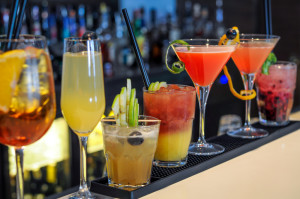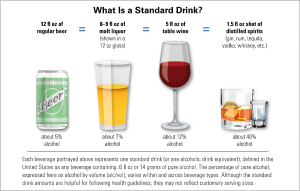 You may have heard the old adage that “A drink is a drink is a drink.” The saying means that one beer is equal in strength to one glass of wine is equal to one mixed drink or one shot. Once upon a time, this saying probably held a little more truth. Unfortunately, these days with the extreme variation in alcoholic beverages available (from craft beers to session ales to craft distillers and cask strength whisky), one drink can mean many things to different people – and the alcohol content of one drink can vary wildly. Of course, that means that the way each person is affected by different drinks can vary wildly, too.
You may have heard the old adage that “A drink is a drink is a drink.” The saying means that one beer is equal in strength to one glass of wine is equal to one mixed drink or one shot. Once upon a time, this saying probably held a little more truth. Unfortunately, these days with the extreme variation in alcoholic beverages available (from craft beers to session ales to craft distillers and cask strength whisky), one drink can mean many things to different people – and the alcohol content of one drink can vary wildly. Of course, that means that the way each person is affected by different drinks can vary wildly, too.
When it comes to blood alcohol content (BAC), you may have also heard that having only one drink per hour will probably keep you sober enough to drive. This is based on the belief that the average human liver can process one drink’s worth of alcohol in one hour. Unfortunately, that also may not be true. Depending on who you are and what you’re drinking, having more or less than one drink per hour can still be enough to put your BAC over the legal limit of .08% BAC, resulting in intoxication and making it illegal for you to get behind the wheel.
What is the Standard Drink?
When the standard drink was first defined, the definition considered that the majority of alcoholic beverages being consumed were largely similar. Until recently, the average beer drinker had access to regular beer (like Budweiser or Coors Banquet) that had about a 5% alcohol content or a light beer (like Bud Light or Miller Light) that had 4.2% alcohol by volume. Wine drinkers drank wine that was about 12% alcohol, and liquor drinkers had drinks that were 1.5 fluid ounces and 40% abv or 80 proof.
Click Image for full size view
This graphic from the National Institute on Alcohol Abuse and Alcoholism (NIH) summarizes the traditional view:
Craft Beer and Other Modern Drinks
Unfortunately, the standard drink model is less applicable in 2018. According to one study, the average craft beer sold in 2014 was 5.9% ABV, nearly 18% stronger than a traditional regular beer. Nowadays, there are many beers available at bars that are 10% ABV or more. Dogfish Head, one of the nation’s largest independent craft breweries regularly makes beer that is around 18% ABV (World Wide Stout, 120 Minute IPA, Fort, and others). One 12-ounce beer that is 18% ABV is stronger than 4 Bud Lights!
Similarly, craft distilleries and non-standard liquor offerings are becoming more popular. Single barrel bourbons and cask strength whiskies are widely available. Cask strength means that the liquor is not diluted from the liquor available in the barrel where the liquor is aged. This will vary from one liquor to the next, from one brand to the next, and from one year to the next. For comparison, however, Maker’s Mark is a popular bourbon that is normally sold at 45% ABV or 90 proof. One recent bottle of Maker’s Mark Cask Strength is 55.65% ABV or 111.3 proof. This means that the Cask Strength version can get you intoxicated nearly 25% faster.
What this Means for Intoxication
Under New Jersey’s drunk driving law, it doesn’t matter how many drinks you’ve had. You can be arrested and charged if you are driving while intoxicated, meaning you can be convicted of DUI or DWI if you are impaired. If a blood alcohol test or breathalyzer test finds that your BAC is over .08%, you can be convicted even if you don’t feel drunk and your driving isn’t affected. This means that the law doesn’t care if you’ve only had one drink, since one STRONG drink can actually be more alcoholic than four light drinks and can get you drunk 4 times faster!
Therefore, we at the Edward M. Janzekovich law blog always recommend that you have a designated driver or call a taxi or Uber if you’ve had even one drink. If you or someone you know is pulled over after drinking, telling a police officer you only had one drink may not mean anything. Instead, we recommend keeping what you say to a minimum, because anything you say can be used against you. If you or someone you know is arrested, charged, or convicted, calling a good attorney as soon as possible will be the best defense.
New Jersey DUI Defense Attorney Edward M. Janzekovich Is There If You’ve Been Arrested, Charged, or Convicted
A DUI/DWI charge for operating a motor vehicle will involve many complicated evidential issues. Such a charge can also result in severe penalties that affect you and your loved ones. If you are charged with drunk driving or driving under the influence of any substance in New Jersey, an experienced DWI/DUI attorney can make all the difference. To speak with an experienced New Jersey DWI lawyer about your situation, call us at 732-257-1137 or contact us online today. We serve clients throughout the state of New Jersey.



